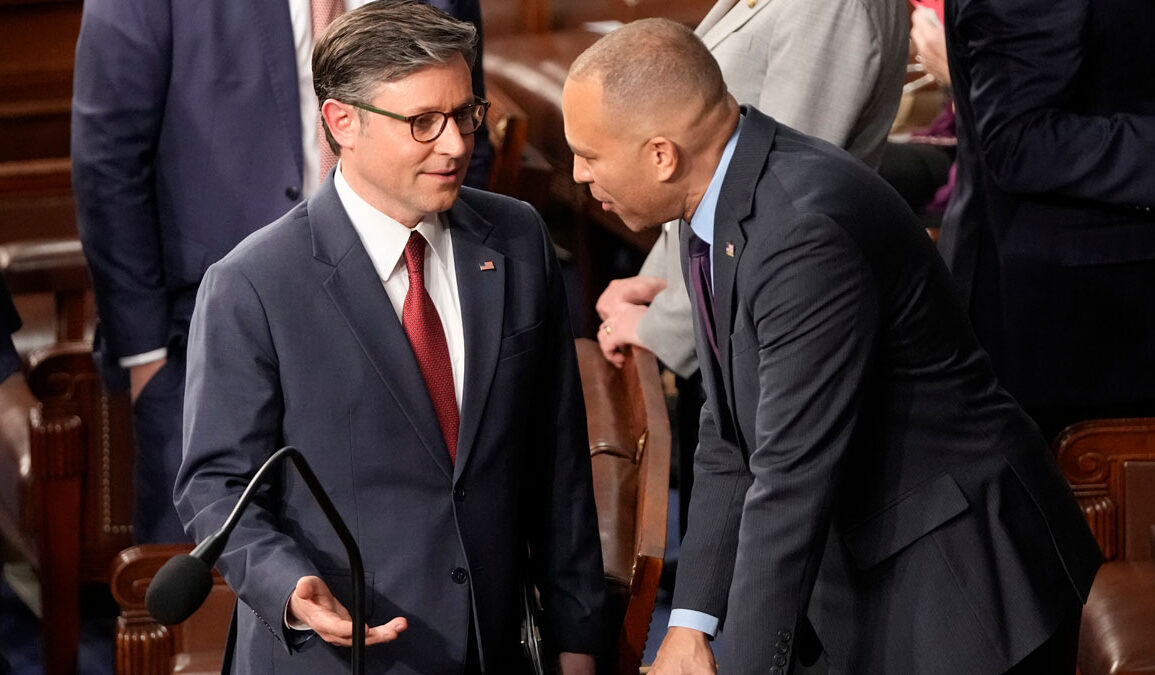The Republican Party opened the 119th Congress with high hopes and a razor-thin majority, but the ceremonial election of a House Speaker quickly revealed the fault lines within their ranks. Louisiana Congressman Mike Johnson ultimately retained the Speaker’s gavel, but the path to victory underscored the fragility of GOP unity and hinted at the tumultuous road ahead.
A Dramatic Vote Unfolds
On what was supposed to be a routine day, the Republican majority was tested almost immediately. While Johnson was nominated with enthusiasm by GOP Conference Chair Rep. Lisa McClain, several conservative hardliners withheld their support during the initial roll call. Representatives Ralph Norman of South Carolina, Keith Self of Texas, and Thomas Massie of Kentucky either voted for alternative candidates or abstained, creating a precarious situation.
Behind closed doors, frantic negotiations began. Johnson allies, along with President-elect Donald Trump, made urgent appeals to the holdouts. Trump personally called Norman and Self, urging them to fall in line. Norman later explained his change of heart, saying he received verbal assurances from Johnson on commitments to fiscal responsibility and adherence to Trump’s agenda. “I said, ‘Mike, are you going to give us specific examples of fighting for the things we mentioned? Will you give us your word?’ He said, ‘Yes.’ So I said, ‘OK, we’ll take you at your word.’ That’s why I changed my vote,” Norman recounted.
Massie, however, remained steadfast in his opposition, casting his vote for Rep. Tom Emmer of Minnesota. Despite this, Norman and Self flipped their votes, allowing Johnson to secure the gavel with a narrow margin of 218-215.
Chip Roy of Texas, another key player, initially abstained from voting. He reportedly spoke with Trump, seeking assurances that he wouldn’t face public attacks or primary threats from the former president. After these reassurances, Roy ultimately supported Johnson, though the tensions underscoring these conversations remain a lingering issue.
The Fault Lines Within the GOP
The brief revolt highlighted persistent fractures within the Republican Party, particularly between Trump loyalists and fiscal hardliners like Massie. The House Freedom Caucus continues to wield significant influence, and its members remain skeptical of leadership decisions they believe compromise conservative principles.
Rep. Tony Gonzales of Texas expressed his frustration with the in-fighting on social media, writing, “Tough to save a country when Republicans can’t get out of our own way.” His comment reflects a wider sentiment within the GOP ranks that internal divisions could sabotage their legislative goals.
Despite these tensions, Johnson managed to avoid the days-long voting marathon that plagued his predecessor, Kevin McCarthy, who only secured the Speakership after 15 rounds of voting in 2023. However, Johnson’s victory wasn’t without cost. As Rep. Ralph Norman and 10 other conservatives made clear in a letter, their support was conditional and motivated by their loyalty to Trump’s agenda rather than unwavering confidence in Johnson’s leadership.
“We supported him … to ensure the timely certification of [Trump’s] electors despite our sincere reservations regarding the Speaker’s track record over the past 15 months,” the letter read.
Trump’s Influence Looms Large
Trump’s involvement proved decisive in resolving the impasse. His phone calls and public endorsements pushed hesitant Republicans into Johnson’s camp. “A win for Mike today will be a big win for the Republican Party,” Trump posted on Truth Social shortly before the final votes were cast.
However, Trump’s support comes with caveats. People close to the former president describe his view of Johnson as lukewarm. While Trump finds Johnson likable, there are doubts about whether he possesses the toughness required to steer such a divided caucus.
For his part, Johnson has made no effort to hide his alignment with Trump. He spent New Year’s at Mar-a-Lago and frequently describes himself as a “quarterback” executing Trump’s plays.
What Lies Ahead for Speaker Johnson?
Johnson now faces a series of monumental challenges. With only a one-vote margin for party-line legislation, every GOP defection carries enormous weight. Government funding deadlines, debt ceiling negotiations, and an ambitious legislative agenda from the Trump administration will require near-total unity.
The newly reelected Speaker has pledged to prioritize border security, fiscal discipline, and reducing the power of the federal bureaucracy. “In coordination with President Trump, this Congress will give our border and immigration enforcement agents the resources they need to do their job. We will secure the border. We will deport dangerous criminal illegal aliens and finally finish building the border wall,” Johnson said in his post-election speech.
However, conservative hardliners remain skeptical of his ability to follow through. The memory of last year’s near-government shutdown and Johnson’s promises to cut $2.5 trillion from federal spending still lingers. Few in Washington believe such cuts are realistic, and repeated showdowns over spending could further strain party unity.
Prospects for the 119th Congress
Johnson’s leadership will be tested repeatedly in the coming months. While the rules adopted by the House make it harder to oust a Speaker, the narrow GOP majority ensures every key vote will be a nail-biter.
Rep. Lisa McClain, who nominated Johnson, reminded her colleagues of the stakes: “No speaker is perfect. None of us will get exactly what we want. The fundamental collective goal of this body is to make progress for the American people.”
If Johnson can balance the competing demands of archconservatives and establishment Republicans while maintaining Trump’s support, the GOP may achieve some legislative victories. However, even small missteps could plunge the House into chaos once again.
For now, Johnson holds the gavel—but in a Congress this divided, his grip remains precarious. As Rep. Norman put it, “Mike has got a tremendous opportunity to show the American people that not only he’s just going to say it, he’s going to fight it.”








